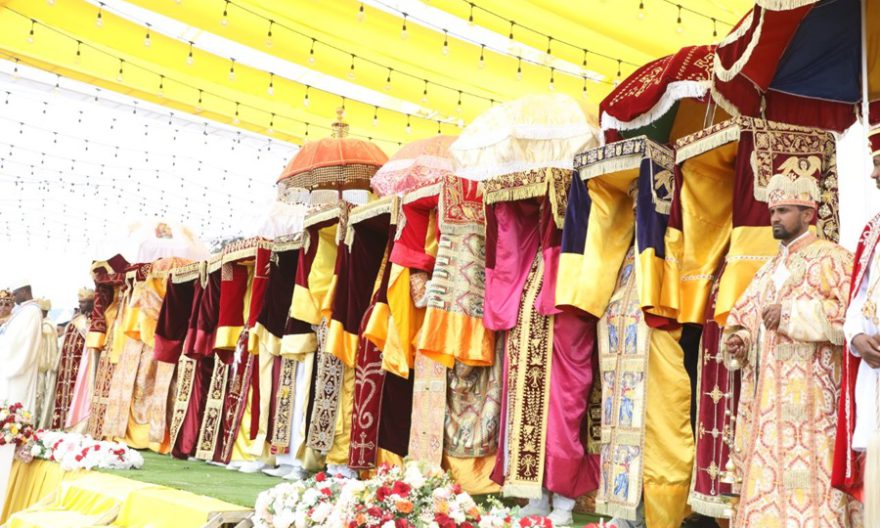
Timket also known as Ethiopian Epiphany, is a vibrant and spirited street festival celebrated annually in Ethiopia. This religious and cultural extravaganza holds immense significance in the Ethiopian Orthodox Tewahido Church and the Ethiopian Catholic Church and is considered as one of the most important events in the country. With its roots tracing back to biblical times, Timket is a time of great rejoicing, renewal, and commemoration. Ethiopia’s historical connections to Christianity have shaped the festival into what it is today. With a blend of religious customs and age-old traditions, Timket has become the most cherished intangible asset in the country.
According to preaching from the EOTC, one of the essential rituals of Timket involves the blessing and consecration of water. Water is believed to be sanctified through prayers, symbolizing the Baptism of Jesus in the Jordan River by John the Baptist. Congregations collect this holy water to take home, symbolizing spiritual purification.
The commemoration of Timket starts on the eve of the main festival. The eve is known as Timket, which means blocking the flow of water for the blessing of the celebrants. On the eve of Ketera, people escort their parish church Tabot (replicas of the Ark of the Covenant) to Timkete-Bahir (a pool, river or artificial reservoir), transported by a priest of the parish and accompanied by a great ceremony.
The people spend the night attending night-long prayers and hymn services. Hundreds of thousands participate in the actual festival on the following day – 19/20 January. The celebration starts early in the morning with pre-sunrise rituals. These are followed by the sprinkling of the blessed water on the congregation, as well as other ceremonies. At around 10:00 a.m., each Tabot begins its procession back to its respective church, involving an even more colorful ceremony with various traditional and religious songs. The viability of the element is ensured through its continued practice, with Orthodox clergies playing a pivotal role: they sing the praises dedicated to the rituals and hymns, carry the Ark, and preach relevant texts.
During Timket all people regardless of age, gender ethnicity or any other background flow out of their house to accompany and escort the arks (Tabots) to the sacred places arranged to them to spend the night. On the Ethiopian Timket festival, there are two major ceremonial occasions that take place at a time starting from the eve up to the end. One is the spiritual ceremonial process that takes place by religious leaders, priests, Sunday schools students, harpist, and ecclesiastics, among others.
As usual, this year’s Timket festival will be celebrated colorfully in all parts of the country. The Ethiopian Orthodox Tewahido Church (EOTC) Holy Synod Member urged the faithful to promote peace, love and unity while celebrating Ethiopian Epiphany (Timket).
EOTC Holy Synod Member and Bishop of Central Gondar Zone, Abune Yohannes said that Timket holiday commemorates the Baptism of Jesus Christ in the Jordan River and the Harrowing of Hell.
Abune Yohannes noted that celebrants should be cautious and appear in a soothing and tranquil manner while observing this year’s Timket in Gondar, Amhara State. This year’s Epiphany celebration has manifold advantages in promoting the positive image of Gondar in particular and Ethiopia in general. Therefore, efforts are underway to celebrate this outdoor festivity peacefully in harmony, he expressed.
Moreover, the Timket festival has become a must-see ritual festival in Ethiopia. The day amuses participants. The ceremonial occasion is undertaken with appealing Ethiopian Orthodox Tewahido Church (EOTC) Sunday school students songs, priests sanctify, various religious preaching, different cultural songs, cultural dancing, among others.
The day gives an opportunity for local participants and tourists to discover most of the cultural dressings found in Ethiopia. Not only this, one will be satisfied while observing the colorful dressing of the peoples that is added with smiley faces without ages limitations. Timket requires meticulous planning and active participation from local communities. Weeks before the festival, neighborhoods organize cleaning campaigns to spruce up their churches, streets, and gathering areas. They also engage in fundraising activities to ensure the success of the celebrations.
It is common to see the youth engaged in cleaning the streets of Addis Ababa before and on Ketera to give more color to the festival. They decorate the streets of the city with the tri-colors-green, yellow, and red. And most of the time they work voluntarily through organizing themselves based on their vicinity. To this end, the Timket celebration voluntarism activities grow to more efforts to help others.
Following this, youths cultivate the best experiences from their peers and keep the forefathers’/foremothers’ best preaching, culture, learn about the culture and tradition of other ethnic group which helps them to accept, appreciate and respect differences among others.
Behind the scenes, dedicated committees oversee the logistics of Timket celebration. They coordinate security measures, crowd control, transportation, and the allocation of resources. These preparations contribute to the smooth operation of the festival, ensuring that everyone can partake in the festivities and experience the joy of Timket. More importantly, Timket festival usually ends peacefully and colorfully. And it is possible through the active participation of every stakeholder.
In sum, Ethiopia is a land rich in folklore and storytelling traditions, and Timket provides a platform for these stories to be shared and celebrated. Folklore performances, storytelling sessions, and traditional music and dance performances take place throughout the festival, captivating audiences with tales of heroes, myths, and legends. Timket has a significant impact on local communities, both economically and socially.
In addition, the festival creates opportunities for local artisans, food vendors, and small businesses to showcase and sell their products. It also brings people from different communities together, fostering social cohesion and promoting cultural exchange.
BY TEWODROS KASSA
THE ETHIOPIAN HERALD SATURDAY 20 JANUARY 2024





